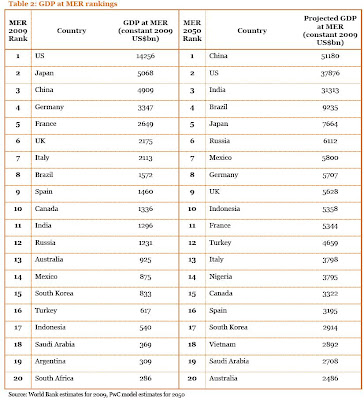First, compare the total size of the G-7 and the E-7 economies, in 2009. At market exchange rates, the E-7 is about one-third of the G-7 in 2009. In purchasing power parity exchange rates (which help to account for the fact that money can often buy more of certain goods in low-income countries), the E-7 is about two-thirds of the G-7 in 2009. "In our base case projections, the E7 economies will by 2050 be around 64% larger than the current G7 when measured in dollar terms at market exchange rates (MER), or around twice as large in PPP terms."
This change represents a remarkable shuffling of the economies of the world. To get a sense of the change, compare the rank order of the economies of the world in 2009 and 2050. In 2009, the U.S. is the world's largest economy. By 2050, U.S. economy will be about 2.5 times as large--and is projected to be in third place in absolute size, behind China and India. What other countries move up the rankings notably by 2050? Brazil, Mexico, Indonesia, Turkey, Nigeria, and Vietnam. To my 20th century mindset, some of those countries just don't seem like global economic heavyweights. Time to start adjusting my mind to the coming realities.
Of course, per capita GDP looks quite a bit different. China and India have vastly larger populations than the United States. After 40 more years of rapid growth, per capita GDP in China will by 2050 roughly reach the U.S. per capita GDP in 2009. But by that time, U.S. per capita GDP will have more-or-less doubled. On a per capita GDP basis, China won't come close to catching any of the G-7 countries even by 2050--in fact, on these projections, China doesn't catch up to Mexico in per capita GDP by 2050.
In an earlier post, I discussed China's Will China catch up to the U.S. economy?


